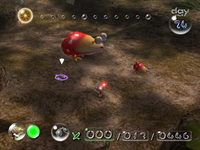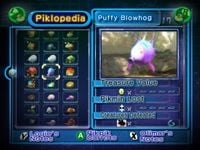Enemy
|
The following article or section is in need of assistance from someone who plays Pikmin 3. |
The Pikmin encounter a multitude of enemies on PNF-404. With few exceptions, these are both predators and prey, and they have varied characteristics and appearances. Defeating enemies constitutes a major part of gameplay in all Pikmin games.
Predator enemies have varied attacks, and some take the advantage of hazards to cause damage to Pikmin who are not immune to them. Offensively, enemies either eat Pikmin or hurt them with attacks, both melee and projectile-based, and with effects that range from pushing the Pikmin off to outright killing them. A few enemies are incapable of directly killing Pikmin.
Killed enemies may drop pellets, which can be brought to an Onion to exchange for Pikmin seeds. Defeated enemies that leave a corpse can also be returned to an Onion or the Research Pod, being exchanged for Pokos in the case of the latter. An enemy under the effect of an ultra-bitter spray will vanish when its health drops to zero; nectars or sprays then have a chance of dropping instead.
Some enemies contain important items like ship parts or treasures which they drop when defeated; these will still be dropped even if the creature was petrified. Most downed enemies will also safely release any Pikmin in their grasp, regardless of any apparently fatal damage caused when the Pikmin was trapped (like the Cloaking Burrow-nit's impalement). This allows otherwise doomed Pikmin to be saved.
Bosses
Some particular types of enemies are larger or stronger than the other, more common ones, but appear less frequently. These are known as bosses, and normally only one or two of each type appear in the entire game. Given that battles against them are usually more difficult, the rewards tend to be better, such as a large number of Pikmin seeds, Pokos, or an important story-related item. In Pikmin, defeated bosses do not respawn. In Pikmin there are 3 bosses, 2 of which have their own track. Those 2 being the Beady Long Legs and Emperor Bulblax. The Smoky Progg is a secret boss. The Puffstool, Mamuta and Goolix are mid-bosses. Pikmin 2 has the most bosses (being 12) and 10 of them share the same music track. Exceptions are the Waterwraith's 2nd form (without rollers), the Giant Breadbug and the Titan Dweevil. In Pikmin 3, the bosses are actually called bosses in game. There are 6 of them in the game. The music track is changed and plays 3 different stings, "normal", "danger" (when the boss attacks) and "attack chance". The only exclusive tracks belong to the Vehemoth Phosbat and the Plasm Wraith. In Mission Mode you can challenge the bosses to get a medal. There are 3 mid-bosses in the game. They are the Shaggy Long Legs, Bug-eyed Crawmad and the Burrowing Snagret. The mid-boss theme in this game is the boss theme from Pikmin 2. The Calcified Crushblat and Peckish Aristocrab are in between regular enemy and mid-boss.
| Boss | Time Given | Bronze | Silver | Gold | Platinum |
|---|---|---|---|---|---|
| Armored Mawdad | 8:00 | ? | ? | ? | 2:00 |
| Vehemoth Phosbat | 15:00 | ? | ? | ? | 5:00 |
| Sandbelching Meerslug | 12:00 | ? | ? | ? | 3:00 |
| Scornet Maestro | 10:00 | ? | ? | ? | 3:00 |
| Quaggled Mireclops | 15:00 | ? | ? | ? | 5:00 |
| Plasm Wraith | 12:00 | ? | ? | ? | 5:00 |
The definition of a boss in the Pikmin series is not very clear. The most commonly held definition is that an enemy is considered a boss if it only appears in a few and specific spots in the game, it is stronger than other enemies and/or it guards an important item. Most bosses do have a specific or shared music theme, but this is not always the case.
A list of bosses can be found here.
Behavior
Most enemies roam around in a specific location of the area, leaving only to chase after or run away from Pikmin or leaders. Some enemies are quite dedicated to their initial spots, returning to it after wandering too far. The locations in which enemies can be found sometimes depends on their nature. For instance, the fur-coated Hairy Bulborbs are better suited to cold environments, and as such, as commonly found in ice-themed caves.
Enemies are normally killed by Pikmin attacks, which becomes easier the more Pikmin are attacking. They can also inadvertently kill themselves by ingesting White Pikmin, falling off pits, or rarely, by coming into contact with certain hazards.
As threats to Pikmin, enemies can attack in a variety of ways, the most common one being eating them. They can also crush them, kill them with a hazard they're vulnerable to, and knock them out with an explosion, amongst other methods. For some of these attacks, there is a cap on the number of Pikmin that can be affected from it. For instance, in Pikmin, a Red Bulborb may only grab and eat three Pikmin at most, with a single bite, but in Pikmin 2, five can fall prey to the same bite.
Interactions
For the most part, every enemy is its own entity, interacting only with the Pikmin and leaders. Some enemies, however, have passive or active interactions with the environment, other enemies, or miscellaneous objects.
Environment interactions
- In Pikmin 3, most enemies will be unable to detect Pikmin and leaders if they are hiding under tall plants.
- In Pikmin 2, if an Emperor Bulblax gets close to a bomb-rock, it will eat it without needing to be coaxed into doing so.
- The fire on a Fiery Bulblax's back will be put out should it go into water. It will reignite once the enemy leaves.
- If a member of the Mandiblard family touches water, it will steadily lose health.
Cooperation
Some creatures keep a bond with others. To maximize the chances of survival, some enemies can be seen next to others, normally of their own species, and oftentimes interacting with them when a fight for survival is taking place. Dwarf Red Bulborbs, Dwarf Bulbears, etc. are often found next to larger enemies of the same species or of the species they are mimicking. When under attack, they may scream in order to wake up their larger allies.
Other creatures choose to follow a leader, normally of their own family. An example is the Bulbmin, who lose all sense of control should their leader perish, and the Scornets, who obey the command of the Scornet Maestro.
Hostility
Hostility between enemies is non-existent, but cases of enemies damaging each other are not. Some enemies may, if inadvertently, hurt others. This normally happens when they try to kill Pikmin or leaders. Not many enemy attacks are made to hurt others, but the following exceptions exist:
- The Empress Bulblax can kill its young by rolling into them.
- A Gatling Groink can damage other enemies with its shots.
- A Lithopod's boulders can harm other enemies or even the launcher itself.
- The Raging Long Legs can stomp on and kill other enemies, particularly on the Angle Maze.
- Volatile Dweevils and Careening Dirigibugs can harm other enemies with their bomb-rocks.
- In Pikmin 3, Yellow Wollywogs can kill or injure other enemies if it lands on them.
As a gameplay element
In the games, enemies locations are relatively evenly spread, in order to maximize the balance between exploration and combat, as to not overwhelm the player. More important locations, however, are generally covered by stronger enemies, requiring the player to excel in combat skill if they are to obtain the rewards that lie behind them. Analogously, easier enemies are encountered closer to the landing sites and the first floors of caves.
Enemies that are killed do not reappear until the leaders leave, regardless of leaving a corpse. Some enemies do however respawn after an in-game day has passed, or after a cave is entered and exited, although others might require the passing of some full days before returning. In addition, some only appear in specific days, as is the case with the Goolix and the Mamuta on The Impact Site. Besides respawning, some enemies can actually revive after they've been considered dead, and a few have a natural health regeneration mechanic.
Intelligence-wise, enemies have a very simplistic artificial intelligence system. Some bosses are hard-coded to perform more specific actions and reply to more specific events, but for the most part, enemies can recognize the presence of a Pikmin, when to attack, when to shake Pikmin off, when to return to their home spot, and not much else. On top of that, their path recognition systems are non-existent: when they want to reach a spot, they head directly towards it, with no regard to any walls or obstacles. Most of the time there are no obstacles in the way (or if there are, they can be slid through), but otherwise, this can lead to them getting stuck behind them, endlessly walking in place.
This simplicity, however, is required to minimize the development costs and the processor usage, given that more complex path recognition systems could end up lowering the game's framerate. Another trick to minimize processor usage is to simply not render or recognize any enemy that lies beyond the camera's reach. These tricks allow the game to run smoothly without severely compromising the game and the enemies' livelihood.
List
The following is a list of enemies in the Pikmin series. Names in bold belong to enemies that are considered bosses. You may also browse the available categories on Pikipedia, with the top one being Enemies.
Enemies in Pikmin
- Category: Pikmin 1 enemies
Enemies in Pikmin 2
- Category: Pikmin 2 enemies. Read Piklopedia for a more detailed list.
Enemies in Pikmin 3
Category: Pikmin 3 enemies
In-game encyclopedias
- Main article: Enemy reel.
- Main article: Piklopedia.
The enemy reel is a special movie at the end of Pikmin. It showcases short clips featuring all enemies in the game, accompanied by a minor description of each.
The Piklopedia is a catalog of enemies and plants, available before entering an area at the start of a day in Pikmin 2. This list is filled with enemy entries as they are killed in the game. Each entry also details the amount of Pokos the enemy is worth, how many of them have been killed so far, Olimar and Louie's notes, and it allows the player to view them roaming around and eat thrown Pikpik carrots, using a free camera mode.
Names in other languages
| Language | Name | Meaning | Notes |
|---|---|---|---|
| Inimigo | Enemy | Translation taken from the Pikmin instruction manual. |

